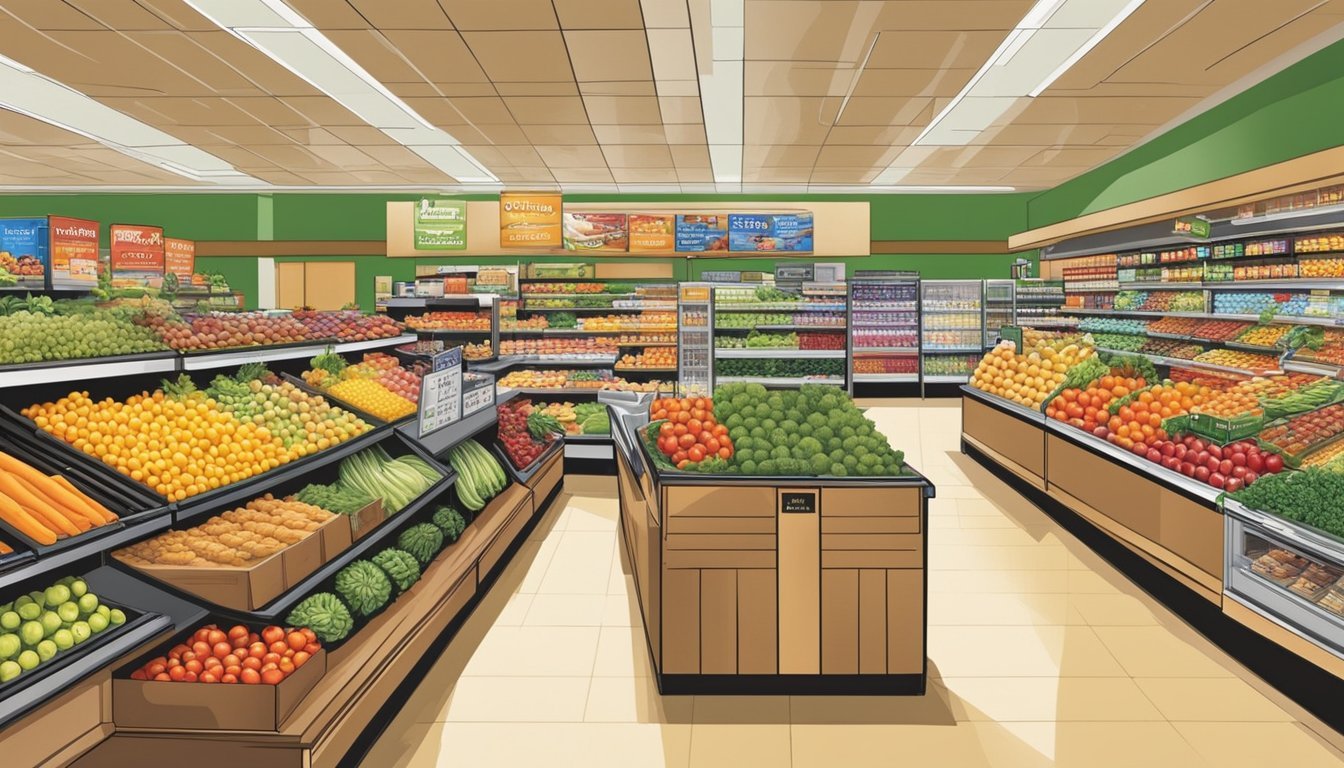Wegmans vs Hy-Vee
Comparing Quality, Prices, and Services
When it comes to choosing a grocery store, shoppers look for a blend of quality, variety, convenience, and value. Two prominent names that consistently come up in discussions about top grocery destinations in the United States are Wegmans and Hy-Vee. Both have carved out substantial markets in different regions of the country and hold strong reputations for delivering a quality shopping experience.
Wegmans, a family-owned supermarket chain, is known for its large stores, often twice the size of a typical grocery store. With a vast selection of goods ranging from basics to specialty items, it continues to attract a dedicated customer base in the regions it serves. Meanwhile, Hy-Vee stands out as an employee-owned operation spanning multiple states in the Midwest. This chain is praised not only for its food offerings but also for additional services like dry cleaning and the sale of fishing and hunting licenses.
Evaluating which grocery store is better involves looking at various aspects such as product diversity, store layout, customer service, and pricing. While Wegmans offers expansive store sizes that can provide a wide array of goods, Hy-Vee's commitment to community-focused ownership and additional services presents a strong case for its customer appeal. Each store has unique strengths that cater to different shopper preferences.
Company Profiles
Wegmans and Hy-Vee stand as prominent grocery store chains in America, each with unique histories and market positions. The following subsections offer a snapshot of their origins, growth, and current operations.
Wegmans: A Brief Overview
Wegmans Food Markets, Inc., commonly known as Wegmans, is a privately held American supermarket chain founded in 1916. The company began as a small food business in Rochester, New York, and has since grown into one of the most recognized grocery store chains. Wegmans is known for combining the attributes of a supermarket and a European open-air market, providing a distinctive shopping experience. As of now, Wegmans operates 106 stores across New York, Pennsylvania, New Jersey, Maryland, Massachusetts, Virginia, North Carolina, and recently Delaware.
Locations: New York, Pennsylvania, New Jersey, Delaware, Virginia, Maryland, Massachusetts, North Carolina
Headquarters: Rochester, New York
Hy-Vee: History and Growth
Hy-Vee, Inc. is an employee-owned chain of more than 240 supermarkets spread across the Midwestern United States. Established in 1930 in Beaconsfield, Iowa, by Charles Hyde and David Vredenburg, Hy-Vee places an emphasis on its slogan, "A helpful smile in every aisle," reflecting the company’s customer service approach. Hy-Vee has been evolving over the years, responding to changing consumer needs by diversifying their store formats and offerings, which now ranges from convenience stores to large grocery supercenters.
Founded: 1930, Beaconsfield, Iowa
Employee-owned: Yes
Store concepts: Grocery supercenters, convenience stores, dollar format, alcohol outlets, in-store deli
Locations: Primarily in the Midwest of America
Regional Presence and Expansion
In the competitive grocery store landscape, Wegmans and Hy-Vee each have distinctive approaches to regional presence and market expansion strategies. Their impacts and outreaches are pivotal to their brand identities and customer base.
Wegmans' Regional Impact
Wegmans, a family-owned supermarket chain, commands a significant presence in the Northeast and Mid-Atlantic regions, including in cities like Philadelphia and as far south as Washington, D.C. They are known for their strong regional influence and community-focused business approach. Wegmans operates a network of stores that are heavily concentrated in New York, Pennsylvania, New Jersey, Virginia, Maryland, Massachusetts, and North Carolina.
Number of Stores: Approximately 106
Key Markets: New York, Philadelphia, Washington, D.C.
Noted for: High-quality products, extensive variety, and strong community ties.
This concentrated regional strategy has allowed Wegmans to maintain a strong brand loyalty and identity within the communities it serves.
Hy-Vee's Market Outreach
Hy-Vee, on the other hand, is an employee-owned chain that traditionally dominated the Midwest with over 250 stores. They have a significant presence in eight states and offer a wide range of services, which often include dry cleaning and the issuance of fishing and hunting licenses alongside their grocery offerings.
Expansion Plans: They have recently announced plans to venture into new markets, including states such as Alabama, Indiana, Kentucky, and Tennessee, marking its first new state entries since its expansion to Wisconsin in 2009.
New Market Cities: Huntsville, AL; Indianapolis, IN; Louisville, KY; Knoxville, TN; Nashville, TN; Memphis, TN.
Projected Growth: Up to 21 new stores in the next four years.
Hy-Vee is building on its regional favorite status by expanding into southern states like Alabama and Tennessee, broadening its market outreach and increasing its competitive standing in the grocery industry. Their expansion strategy significantly relies on understanding and integrating into the communities they enter.
Store Offerings and Features
When comparing Wegmans and Hy-Vee grocery stores, shoppers will find distinctive offerings and features that cater to diverse consumer needs. Each store provides a unique shopping experience through variations in product variety, store brand quality, and additional services.
Variety and Selection of Products
Wegmans stands out with a broad selection of produce, groceries, and specialty items. This grocery store has built a reputation for high-quality fresh seafood and an extensive variety of both national and international food items. Hy-Vee, on the other hand, meets the needs of its customers with a mix of traditional grocery offerings and a focus on health-conscious products, expanding its reach with different store formats to suit varied consumer preferences.
Exclusive Brands and Partnerships
Both stores offer exclusive store brands that promise value and quality. Wegmans features its own line of products that includes an array of meat, baked goods, and other staples. Hy-Vee's equivalent, the SE Grocers brand, competes by offering products that are typically 20% cheaper while matching the taste and quality of national brands.
Prepared Foods and Deli Options
Wegmans is recognized for its array of prepared foods, boasting an impressive deli section where shoppers can find ready-to-eat meals and a variety of artisanal cheeses and meats. Hy-Vee also offers a substantial range of prepared foods, aiming to provide convenience to consumers looking for quick and easy meal options.
Pharmacy and Additional Services
Both Wegmans and Hy-Vee have in-store pharmacies, ensuring customers can fill prescriptions while shopping for groceries. Hy-Vee, in particular, has incorporated a variety of additional non-food offerings in their grocery supercenters, a decision that aligns with their strategy to provide a one-stop-shop experience. Wegmans continues to develop new store formats to further cater to changing customer shopping habits post-pandemic.
Price Comparison and Value
When evaluating Wegmans and Hy-Vee, consumers often consider both price and value. These aspects are critical factors in grocery shopping as they directly impact a shopper’s budget and experience.
Everyday Prices and Discounts
Wegmans is renowned for competitive pricing, often resulting in cost savings for customers on a wide range of items. Shoppers find that Wegmans' everyday prices tend to be lower than those of some competitors, which can translate into considerable savings over time. They also offer a variety of discounts through their shopper's card and weekly ads.
In contrast, Hy-Vee positions itself as a supermarket chain offering quality and convenience, with a focus on customer service rather than being the price leader. Hy-Vee's specials and fuel saver discounts can provide value, but their regular prices might be higher compared to discount-oriented stores.
Quality vs. Cost
Hy-Vee places a strong emphasis on the quality of their products, with an extensive selection of fresh and organic options. They have a reputation for high-quality meat and produce, which can justify higher prices. Loyal customers are often willing to pay more for the quality and service they receive.
Wegmans, while also focused on quality, manages to keep costs lower through efficient store brands and a strategic pricing model. They are often cited for the excellent quality of their store-brand products, allowing customers to choose quality goods at reduced prices compared to national brands.
Customer Experience
When comparing Wegmans and Hy-Vee, two factors are paramount in customer experience: the store's environment and the level of customer service provided. Consumers' preferences vary, but the satisfaction ratings on these aspects can significantly influence their choice of grocer.
Store Layout and Cleanliness
Wegmans is known for its spacious store layout, allowing consumers to navigate aisles and find products with ease. They maintain a high standard of cleanliness, which reflects positively on their consumer satisfaction ratings. This organized environment enhances the shopping experience, making it both efficient and pleasant.
Hy-Vee stores also prioritize a clean shopping area and a well-organized layout. Consumers can expect to shop in a tidy environment with clear signage. The supercenters of Hy-Vee include additional non-food offerings, broadening the consumer's experience beyond traditional grocery shopping.
Customer Service and Satisfaction
Wegmans has a reputation for excellent customer service, regularly landing high on customer satisfaction rankings. Employees at Wegmans are known for being helpful, friendly, and knowledgeable, which contributes to a positive shopping experience for their customers.
Hy-Vee distinguishes itself with high employee satisfaction, which often translates into better customer service. A satisfied workforce can improve the quality of service, and Hy-Vee's ranking in employee satisfaction suggests that consumers will experience attentive and supportive assistance during their shopping visits.
Brand Trust and Reputation
In the competitive grocery market, trust and reputation are vital factors that influence consumer choice. BrandSpark International’s surveys provide insight into the grocery brands American shoppers confide in most. Wegmans and Hy-Vee have both established themselves as trusted names through consistent service and quality.
Awards and Recognitions
Wegmans: It has secured a prominent position in the BrandSpark Most Trusted Awards (BMTAs), reflecting its strong reputation among American consumers. According to Newsweek, the BrandSpark survey indicates that Wegmans is a favored brand, resonating trust with its customers.
Hy-Vee: This brand has also been recognized for its trustworthiness, with a solid showing in the BMTAs. Hy-Vee’s commitment to customer satisfaction has earned it high marks in trust from American shoppers, according to survey data from BrandSpark International.
Consumer Loyalty
Wegmans: The retailer's emphasis on quality products and exceptional customer service has culminated in a loyal customer base. Trust is the cornerstone of this loyalty, with Wegmans frequently receiving praise for its store brand among survey respondents.
Hy-Vee: Similarly, Hy-Vee has garnered a strong following, thanks to its satisfactory in-store experience and efficient checkout process, as noted by Brandspark. Trust has played a pivotal role in Hy-Vee's relationship with its customers, enabling it to maintain a reputable standing in the grocery sector.
Sustainability and Community Involvement
Both Wegmans and Hy-Vee have demonstrated a solid commitment to sustainability and active involvement in their local communities. These efforts reflect the values of the stores and their roles as leaders in the grocery sector.
Environmental Initiatives
Wegmans
Sustainability Measures: Wegmans has taken significant steps towards sustainability. They have a focused plan to eliminate 8,000 pounds of non-recyclable plastic and three specific non-recyclable products from their operations.
Recycling Programs: In 2023, Wegmans announced that all their floral packaging has become fully recyclable or compostable, which is a testimony to their commitment to reduce carbon emissions and limit their environmental footprint.
Hy-Vee
Seafood Sourcing: Hy-Vee has established itself as a leader by being the first Midwest retailer to ensure 100% of its fresh and frozen seafood comes from environmentally responsible sources.
Operational Policies: With a broader view of sustainability, Hy-Vee maintains a company-wide policy of ecological protection and resource conservation.
Support for Local Communities
Wegmans
Local Impact: Wegmans is known for its involvement with local family farmers and suppliers, promoting locally sourced products and supporting the benefits of non-GMO and organic produce.
Community Programs: They actively engage in programs that strengthen the community, including nutrition education and feeding the hungry.
Hy-Vee
Community Services: Hy-Vee deeply integrates itself into the community by offering services beyond groceries, such as dry cleaning and licensing for fishing and hunting, thereby driving local economies.
Employee Ownership: As an employee-owned company, Hy-Vee ensures that its workforce is not only motivated but also personally invested in the well-being of their customers and community.
By maintaining these efforts, Wegmans and Hy-Vee exemplify the role of grocery retailers as stewards of environmental sustainability and community leadership.
Comparative Analysis by Category
In comparing Wegmans and Hy-Vee, specific categories shed light on the relative strengths of each grocery store, providing shoppers with insight into where each store excels.
Fresh Food and Produce
Wegmans is recognized for its wide variety of high-quality fresh foods and produce; it frequently stocks organic and locally-sourced options. Hy-Vee also provides a diverse selection of fruits and vegetables, with a focus on freshness and quality.
Wegmans:
Extensive organic section
Locally-sourced produce when available
Hy-Vee:
Emphasis on fresh, quality produce
Wide range of both conventional and organic options
Grocery Aisles
Within the grocery aisles, both Wegmans and Hy-Vee offer an expansive range of products including national brands and private labels. Wegmans often has competitive pricing, especially for bulk items, and is known for a variety of international foods.
Wegmans:
Competitive prices on bulk items
Wide selection of international cuisine
Hy-Vee:
Strong emphasis on national brands
A comprehensive selection of private label products
Non-Food Items
Non-food items are a staple in both grocery stores, covering categories such as household cleaners, pet supplies, and personal care products. Wegmans typically offers a broad assortment of non-food items with frequent discounts, while Hy-Vee maintains a competent range and focuses on customer convenience.
Wegmans:
Broad assortment of non-food categories
Regular discounts on household brands
Hy-Vee:
Adequate range of non-food items
Focus on convenience and shopper experience
Conclusion
When comparing Wegmans and Hy-Vee, shoppers will find that both grocers have distinctive strengths. Wegmans is renowned for its store atmosphere and high-quality private label products, making it a favorite for those who prioritize a pleasant shopping experience alongside premium goods. Their smaller store formats reflect a strategic adjustment to evolving consumer habits.
Hy-Vee, on the other hand, stands out with its employee-owned structure, which can translate to excellent customer service. The array of services, including dry cleaning and license issuance, adds convenience for customers. Hy-Vee's larger supercenters have diversified offerings that extend beyond groceries, catering to a variety of consumer needs in one location.
Selection: Wegmans might offer a more curated selection, while Hy-Vee provides a one-stop-shop experience with its supercenters.
Wegmans Hy-Vee Upscale atmosphere Wide range of services Quality private label products Employee-owned Smaller, strategic store formats Larger supercenters
Shoppers' preferences are central to determining which store is 'better'. Those valuing a sophisticated shopping environment may lean towards Wegmans. Meanwhile, consumers looking for convenience and an expanded range of services might prefer Hy-Vee. Both chains have loyal followings and are responsive to industry trends, reflecting their commitment to customer satisfaction.









